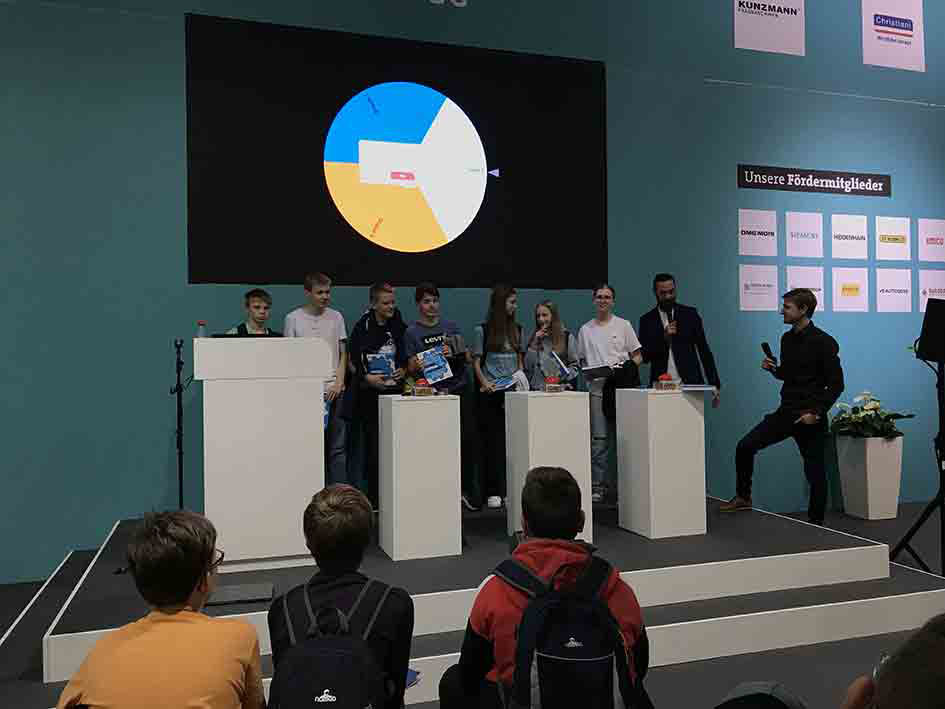The figures speak for themselves: the Hays Global Skills Index reveals that there is currently a shortage of just under 50,000 engineers in the manufacturing sector. The German Economic Institute also predicts that, by the end of the decade, there will be more than twice as many STEM professionals retiring as there are new graduates entering the industry. The current shortage of skilled workers is thus likely to be just the beginning of an increasingly worsening situation – unless countermeasures are taken. And that is exactly what EMO Hannover has set out to do this year. The Special Training stand of the Youth Education and Development Foundation for Mechanical Engineering brings together various initiatives aimed at attracting new target groups to manufacturing companies.
“For us as an industry, the decline in qualified young talent is increasingly holding back growth, on top of all the other challenges it brings,” warns Dr. Wilfried Schäfer, Executive Director of the VDW, which is organizing the EMO Hannover. A flash survey conducted by the VDMA at the end of last year revealed that around 80 percent of the engineering companies surveyed rated the shortage of skilled workers as “worrying” or even “grave”. “We therefore have to find new and creative solutions, including possible workarounds. This is why EMO Hannover is taking up the challenge with its Special Training stand.”
Two target groups in particular offer great potential. These are well-trained specialists from abroad, but above all young people transitioning from school to work. The Special Training stand of the Youth Education and Development Foundation for Mechanical Engineering (Hall 8, A54) will welcome more than 3,000 secondary school students over the course of the week. The Foundation staff have joined forces with participating companies to set up a process chain that allows the youngsters to produce and assemble a Formula 1 race car – a major treat for the teenagers at EMO Hannover. “The aim of this project is to get young people excited about technology and give them some insights into the relevant apprenticeships in mechanical engineering,” reports André Wilms, Head of the Southern Germany branch of the Youth Education and Development Foundation for Mechanical Engineering. “They are supervised by current apprentices from our partner companies. This simultaneously gives the pupils an insight into the world of apprenticeships. We also offer interviews in which the apprentices talk about their everyday lives. We don’t just want to inform the students; we want to inspire them.”
This is also the objective of the TECHventure: technology is more than just math – rally. It takes schoolchildren to various companies and research institutes. At the booths, they learn more about the diverse and exciting opportunities that technical professions offer. “Our students were thrilled to visit an actual trade fair,” says Eva-Maria Müller, a technology teacher at Uplengen High School. “Through the rally, they all had the chance to make genuine connections with the exhibitors at the booths, something that wouldn’t have been possible without this event.”
TECHventure is the prelude to the WGP young talent initiative, which was launched in the spring. “We have also noticed a decline in the number of first-year students at universities for years,” reports Prof. Jens Wulfsberg, president of the WGP (Scientific Society for Production Engineering). “At times, this takes on dramatic proportions and could significantly exacerbate the shortage of skilled workers in the future.” For this reason, the association of 72 leading production science academics intends to use social media in the future to inspire young people to take STEM subjects and technical professions. The WGP has been committed to making production more sustainable and efficient for years now, as demonstrated by its Efficiency Initiative, for example, which it launched in response to the energy crisis. “This is an issue which attracts large numbers of young people. However, few of them are aware of how the technical professions in particular can help them make a major contribution to a sustainable society,” explains Wulfsberg. After the rally, anyone interested can find out all about the latest sustainability trends in production science on the special stands: Future of Sustainability in Production Area (Hall 16, F11) and Future of Connectivity Area (Hall 9, H22).
Throughout the event, human resources and training managers can visit the Special Training stand to discover the best ways not only of attracting young talent, but also of retaining it. In addition, the staff of the Youth Education and Development Foundation for Mechanical Engineering will be giving tips on digitalization in apprenticeships and training, and on unconventional recruitment measures.
Author: Gerda Kneifel, VDW







Leave a Reply